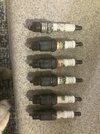I agree with Greg about holding off on the parts cannon. Another idea is to consider not only where the coax is running but also what just happens to be in the vicinity. Most people think "ok, maybe its too close to the engine bay" but not too many consider the mufflers.
This probably sounds odd but sometimes you'll need to ground the muffler with braided copper wire since they can easily gather RF under the right circumstances. Doubly so if you're running straight pipes for whatever reason, those tend to be loud in volume and in RF.
Other sources can be the hood itself, the doors, the battery, etc. These should be fully grounded with braided copper - you can never have too many grounds in regards to RF. The more, the better. Promise.
Try removing the coax from the feedpoint on the antenna, itself, then (while leaving the coax plugged into the radio) turn the radios volume all the way up with the engine running. See if it still makes noise. This is to determine whether the noise is coming through the antenna, itself, or through the coax. It's a compliment to the above observation, basically.
Occasionally in traffic, I will pick up other peoples alternators / ignition sound. In example: I'm stopped in the turning lane and can hear people driving by at normal speed through the radio itself.
Again, don't buy anything YET. Sometimes it's more obvious than you think and is as simple as moving the coax or even the radio itself to another location, other times it requires a new alternator, new plugs, a multitude of things. If you do want to chump change your way with ideas, get braided copper or maybe even some of those cheap $1 clip on ferrite beads. Start there.
Good luck.

